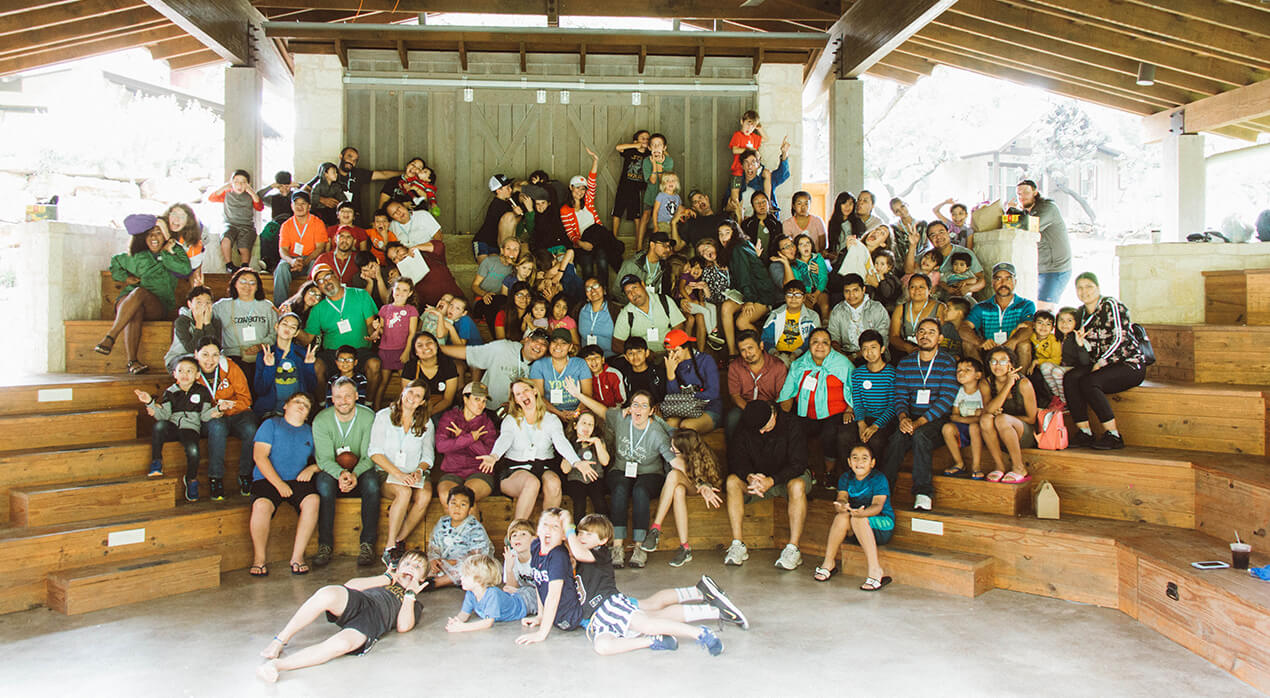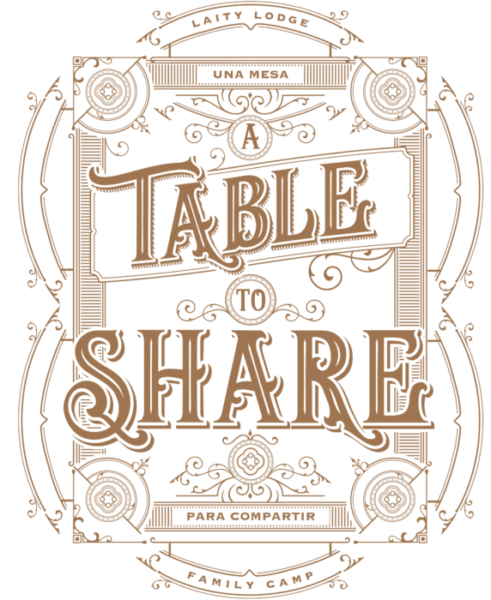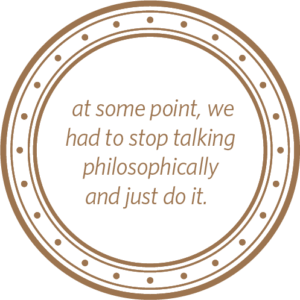
![]() n a mid-September evening in the pavilion at Headwaters, Cary Hendricks, director of Laity Lodge Family Camp, was giving a Roundup talk. One side of the audience was filled with Spanish-speakers. English-speakers sat opposite of them. This was Cary’s first time speaking in front of a bilingual audience.
n a mid-September evening in the pavilion at Headwaters, Cary Hendricks, director of Laity Lodge Family Camp, was giving a Roundup talk. One side of the audience was filled with Spanish-speakers. English-speakers sat opposite of them. This was Cary’s first time speaking in front of a bilingual audience.
He isn’t bilingual.
That rainy weekend was Family Camp’s first fall retreat for 2018, and it was also the first of a kind—a partnership retreat that combined families from Covenant Presbyterian Church in Austin with families from Austin Voices for Education and Youth (AVEY), an organization that works for the educational success of children.

Partnership weekends have been part of Family Camp’s retreat cycle since 2010, made possible thanks largely to support from Texas-based foundations. These weekends are different from typical retreats in that LLFC hosts families affiliated with a partner nonprofit that serves families from vulnerable communities.
While all retreats can have considerable diversity, most retreats tend to have families from either one socioeconomic background or another—that is, families at any given retreat generally come from the same types of neighborhoods. This retreat was an intentional attempt to merge families from different socio-economic environments.
“In the office, we’d talked a lot about getting families from different backgrounds together in the Canyon,” Cary says. “But at some point, we had to stop talking philosophically and just do it.”
“We have a really unique opportunity to experiment with creating space for families from different backgrounds to be together in an unusual way. Because we have that unique opportunity, it’s our responsibility.”
Over a year before this retreat, Cary contacted Covenant with the idea, who then contacted AVEY. Soon after, planning began.
Cary says the frequency of Family Camp’s retreats allows them to try new things, but experiments present unique obstacles. This time, one of those obstacles was the language barrier.
When families sat in the pavilion for Roundup, that barrier was visible. Unable to find a bilingual speaker in time for the weekend, Cary had to give the Roundup talk himself.
“I would’ve liked a translator or a bilingual speaker for Roundup, but I wouldn’t ask anyone to do that if I wouldn’t do it myself,” Cary says. Unfortunately, the talk wasn’t translated. But not all of Roundup needs translation.
“They all really loved the games at Roundup,” says Evangeline Herring, AVEY’s adult education coordinator and a congregant of Covenant Presbyterian Church. “It doesn’t matter what language you speak if you’re together and having fun.”
For devotional time the following morning, the language divide arose again. But this time, Evangeline was Cary’s impromptu translator. She volunteered to translate right before it started, and the two tried to find a rhythm on the spot.
“It was a bit awkward and funny at times,” Cary says, “but Evangeline made a huge difference.”
She wasn’t the only spontaneous translator that weekend. At dinners, families from the different groups sat together. While the majority of the parents weren’t bilingual, many children of the Spanish-speaking families were. Those children translated, acting as mediums for families to learn about one another; all they needed was a table to share.
“We can create a space for people from different backgrounds to interact in a way that isn’t prevalent in society,” Cary says.
The ZIP code around Covenant Presbyterian Church is 86% white with a 14.9% poverty rate. AVEY’s ZIP code is 49% white with a 23.2% poverty rate, almost double the national average of 12.3%. Yet, the two neighborhoods are less than five miles apart.
These numbers represent more than certain neighborhoods falling on harder times than others; they show the cultural and economic divides that exist within cities and that keep people from different backgrounds from getting to know and understand one another. Some neighbors are farther than right-next-door, and those are the ones we tend to forget, or even neglect.
 Family Camp wanted to bring those neighboring families together in a way that they wouldn’t experience otherwise.
Family Camp wanted to bring those neighboring families together in a way that they wouldn’t experience otherwise.
“You hope that everyone feels welcome and there’s no accidental ostracizing from food selection or language barriers or anything else,” Cary says. “We don’t have it all figured out yet, and we saw the importance of experimenting and learning at that retreat.”
“Maybe in the future, that’s having multiple musicians sing in different languages,” he says. “We want the Roundup lineup to reflect the diversity of the guests.”
“It’s hard, when talking about God, to translate everything word-by-word ... but when everyone is having fun together, they feel like there is no language barrier.”
Evangeline Herring, AVEY
Despite the small obstacles that arose, Evangeline says “families from both groups loved the experience, the food, exchanging with others … there was something for everybody.”
The success of the retreat solidified its spot in Family Camp’s schedule. LLFC is planning for the groups to meet again at Headwaters.
According to Evangeline, families from AVEY were already checking how to get back to Family Camp on their way back to Austin. Upon seeing the prices for camp, they realized they’d be unable to come back without the opportunity of partnership retreats.
“From the beginning, everyone [at camp] made both groups feel so special,” she says, “from things like childcare, that some of these families can’t afford, to the games they played together at Roundup.”
“It’s hard, when talking about God, to translate everything word-by-word,” she says. “But when everyone is having fun together, they feel like there is no language barrier.”